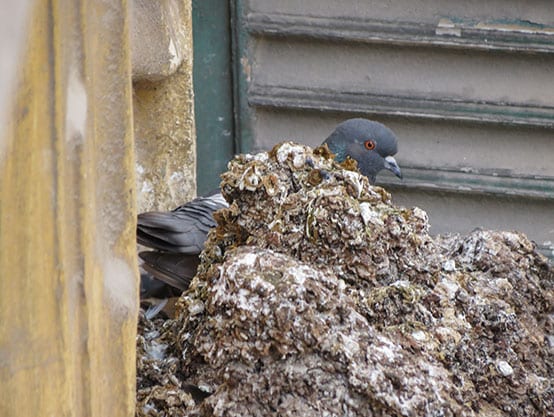
by Pigeon Patrol | Oct 14, 2021 | Bird Law, Bird Netting, Bird Spikes, Columbidae, Doves
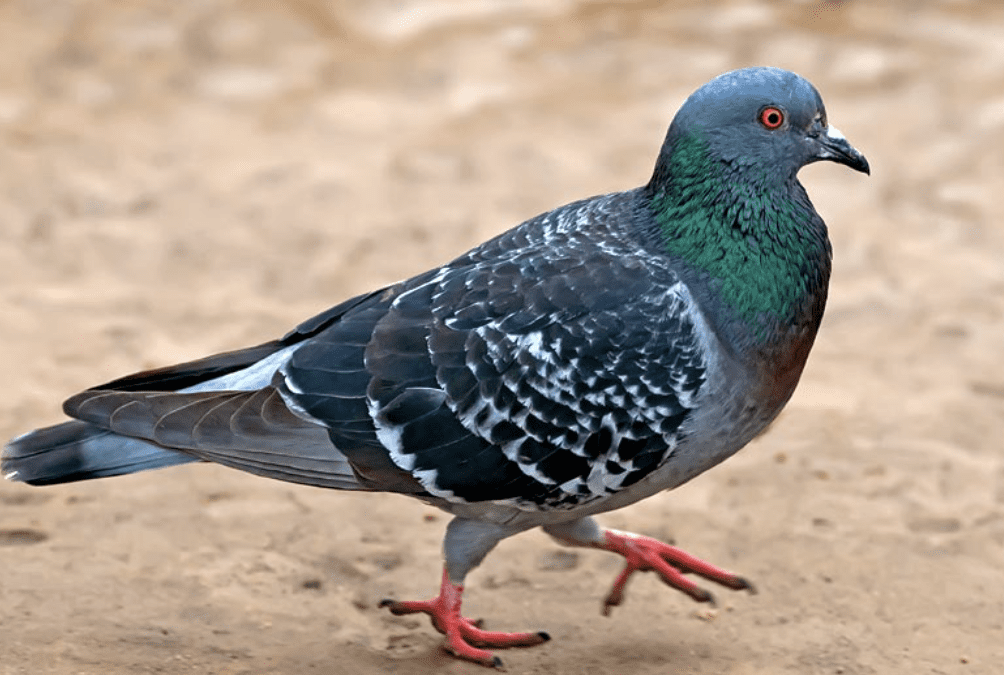
by Pigeon Patrol | Oct 5, 2021 | Bird Netting, Bird Spikes, Columbidae, Doves, pet bird, Pigeon Control, Pigeon Droppings, Pigeon Patrol's Services
Pigeon poop!

It was a nice, clear, warm day and I was enjoying watching the pigeons doing a formation flight above me when I was distracted by two teenagers who were shrieking and cowering under a magazine held above their heads, presumably to shield them from falling poop. I couldn’t help stopping to reassure them that the pigeons wouldn’t poop during this flight, so they could relax and enjoy the sunshine. This incident inspired me to dedicate a page to the enthralling subject of pigeon droppings!
The pigeon’s excretion system is not the same as that of a mammal. The food passes through the digestive system and empties from the rectum into the cloaca.
This literally means “cesspool” and is the “emptying place” for both the digestive and the urogenital system in pigeons. The pigeon has the ability to hold the action of defecating and to contain a considerable volume of poop in the cloaca without relief (Levi, The Pigeon), so unlike humans it is never “caught short”.
When pigeons are about a week old they learn to step backward before pooping and they continue to do this during their adult life, which is why you are likely to be pooped on by a perching pigeon if you are in the wrong place at the wrong time.
The situation is different when pigeons are in flight. Pigeons are designed for flapping or “powered” flight rather than for soaring or gliding flight like the seagull (which admittedly does poop on humans, sometimes deliberately) – so when a pigeon takes off it will immediately begin to draw its feet backward under its body to assist with flight and balance. The feet are held back until the pigeon is about to land, when they are thrust forward and down.
If a pigeon were to poop in flight it would have to risk the poop landing on its feet as they are held below the vent (anus), or it would have to lower its feet. Both of these actions would affect the dynamics of flight. So they don’t do either.  You will usually see a pigeon poop when it is perching on a ledge or branch, or when it is foraging…but not when it is flying overhead.
You will usually see a pigeon poop when it is perching on a ledge or branch, or when it is foraging…but not when it is flying overhead.
Today there is an unreasonable hysteria about pigeon poop, but in earlier times it was so valuable as a fertiliser that it was used as a dowry and left as an inheritance! Even today it is probably the best organic fertiliser for vegetable patches that you can find (after it has been composted, of course).
An officer of London Wildlife Protection wrote to the Department of Health to establish whether pigeon poop is a hazard to human health and if so to what extent. Their reply should reassure even the most cynical pigeon hater or pest controller:
We are not aware of any cases of human infections associated with contact with pigeon faeces.
Whilst wild bird faeces including pigeon faeces can present a potential hazard from infections such as Campylobacter and Salmonella via faecal-oral transmission (i.e. when contaminated bird faeces is accidentally swallowed), there is limited documented supportive evidence for this occurrence. The use of simple hygiene precautions especially hand washing after touching potentially contaminated materials and before eating or drinking should reduce the risk of infection via the faecal-oral route.
A review of human health hazards posed by feral pigeons in 2004 concluded that, “In spite of the worldwide distribution of feral pigeons, the close and frequent contact they have with humans, their use as food, and the high prevalence of carriage of human pathogens, zoonotic disease caused by feral pigeons is infrequent. Although feral pigeons pose sporadic health risks to humans, the risk is very low, even for humans involved in occupations that bring them into close contact with nesting sites.
There are some health hazards associated with pigeon droppings, but these are not as dire as pest controllers and local authorities would lead us to believe:
Like all fecal matter (human and animal) pigeon poop can contain bacteria that are harmful if ingested, so it is best to keep pigeon poop away from food that is about to be eaten and from kitchen work surfaces.
The fungus histoplasma capsulatum, if inhaled, can cause histoplasmosis in humans. There is no record of anyone becoming infected with Histoplasma within the UK but it can be found in river valleys in Eastern and Southern Europe and has caused disease in parrts of North America.. Pigeons don’t carry or spread histoplasma, it is not a disease that can be caught from a bird but under the right conditions (temperate climate, damp acidic soil with high organic content) all bird droppings can produce an environment in which this fungus thrives if it is there in the first place.
Cryptococcus neoformans is another fungus that is found in the dried droppings of birds, including pigeons. When dried bird droppings are stirred up, this can make dust containing Cryptococcus Neoformans go into the air. If inhaled this doesn’t normally affect healthy humans but it can cause disease in people with compromised immune systems, such as those with HIV/AIDS, people who have had organ transplants and those who are being treated for cancer.
Source
Pigeon Patrol Products & Services is the leading manufacturer and distributor of bird deterrent (control) products in Canada. Pigeon Patrol products have solved pest bird problems in industrial, commercial, and residential settings since 2000, by using safe and humane bird deterrents with only bird and animal friendly solutions. At Pigeon Patrol, we manufacture and offer a variety of bird deterrents, ranging from Ultra-flex Bird Spikes with UV protection, Bird Netting, 4-S Bird Gel and the best Ultrasonic and audible sound devices on the market today.
Voted Best Canadian wholesaler for Bird Deterrent products ten years in a row.
Contact us at 1- 877– 4– NO-BIRD, (604) 585-9279 or visit our website at www.pigeonpatrol.ca
Pigeon/Pigeon Patrol / Pigeons Roosting / Vancouver Pigeon Control /Bird Spikes / Bird Control / Bird Deterrent / Pigeon Deterrent? Surrey Pigeon Control / Pest /Seagull deterrent / Vancouver Pigeon Blog / Birds Inside Home / Pigeons in the cities / Ice Pigeons/ What to do about pigeons/ sparrows , Damage by Sparrows, How To Keep Raccoons Away, Why Are Raccoons Considered Pests/ De-fence / Pigeon Nesting/ Bird Droppings / Pigeon Dropping/ woodpecker control/ Professional Bird Control Company/ Keep The Birds Away/ Birds/rats/ seagull/pigeon/woodpecker/ dove/sparrow/pidgeon control/pidgeon problem/ pidgeon control/flying rats/ pigeon Problems/ bird netting/bird gel/bird spray/bird nails/ bird guard

by Pigeon Patrol | Oct 5, 2021 | Columbidae, Doves, history of pigeons, MBCA, pet bird, Pigeon Control
Pigeons are opportunistic eaters, and their willingness to sample a wide variety of foods makes them relatively common in cityscapes. These flexible birds unquestioningly devour a combination of fruits, vegetables, grains, seeds, insects and waste food, and while their lack of scruples contributes to their population, it can also cause health problems and conflicts within groups.

Non-Picky Eaters
Some species of bird are particular about their diets, but the pigeon isn’t one of them. These birds are opportunists who regularly feast on different types of seeds, grains, fruits and vegetables in the wild. They aren’t herbivores, though — they may also prey on small game like worms, insects and snails. With their short, blunt beaks and stout bodies, pigeons aren’t particularly formidable birds of prey, so they typically favor vegetation over meat.
People Food
A pigeon’s willingness to eat virtually any type of food he finds makes him a common sight in urban areas. Pigeons are natural scavengers and hang about near groups of people and outdoor eateries in hopes of catching the scraps that fall to the floor. From miniscule crumbs to larger portions, almost nothing is off-limits to the pigeon. Local governments typically discourage purposely feeding these birds, though, as it may cause problems. When pigeons are fed by humans, they generally lose their fear of people and may become nuisances. Feeding may also cause the population to grow unnaturally large, which in turn leads to fighting amongst the birds over resources.
Finding a Meal
Even in large numbers, pigeons prefer to avoid confrontation, and they feed themselves accordingly. These birds generally stay in large, open areas when looking for food, like town squares, landfills, parks and playgrounds. This affords them high visibility and an easy escape should an apparent threat come near. In urban areas, those threats may include cats, rats and birds of prey like the peregrine falcon.
Commercial Mixes
Because pigeons may be kept as pets, competitors for pigeon racing or release doves (which are white homing pigeons), they may also subsist on commercial pigeon food mixes. These seed diets generally contain the variety of grains, seeds and vegetables that optimize the bird’s diet and health, as too much “people food” can be unhealthy. To illustrate the difference that this mixed food can make, a pet pigeon may easily live 15 years or more. In the wild, pigeons typically survive only three years or so.
Source
Pigeon Patrol Products & Services is the leading manufacturer and distributor of bird deterrent (control) products in Canada. Pigeon Patrol products have solved pest bird problems in industrial, commercial, and residential settings since 2000, by using safe and humane bird deterrents with only bird and animal friendly solutions. At Pigeon Patrol, we manufacture and offer a variety of bird deterrents, ranging from Ultra-flex Bird Spikes with UV protection, Bird Netting, 4-S Bird Gel and the best Ultrasonic and audible sound devices on the market today.
Voted Best Canadian wholesaler for Bird Deterrent products ten years in a row.
Contact us at 1- 877– 4– NO-BIRD, (604) 585-9279 or visit our website at www.pigeonpatrol.ca
Pigeon/Pigeon Patrol / Pigeons Roosting / Vancouver Pigeon Control /Bird Spikes / Bird Control / Bird Deterrent / Pigeon Deterrent? Surrey Pigeon Control / Pest /Seagull deterrent / Vancouver Pigeon Blog / Birds Inside Home / Pigeons in the cities / Ice Pigeons/ What to do about pigeons/ sparrows , Damage by Sparrows, How To Keep Raccoons Away, Why Are Raccoons Considered Pests/ De-fence / Pigeon Nesting/ Bird Droppings / Pigeon Dropping/ woodpecker control/ Professional Bird Control Company/ Keep The Birds Away/ Birds/rats/ seagull/pigeon/woodpecker/ dove/sparrow/pidgeon control/pidgeon problem/ pidgeon control/flying rats/ pigeon Problems/ bird netting/bird gel/bird spray/bird nails/ bird guard
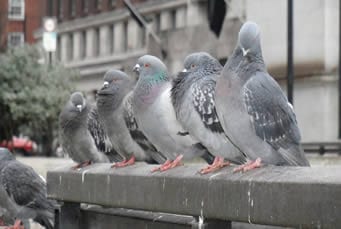
by Pigeon Patrol | Sep 28, 2021 | Columbidae, Doves, history of pigeons, MBCA, pet bird, Pigeon Control
I’m ambivalent about pigeons. Growing up, I ignored them while neighbours fed hundreds on the pavement. I figured as an adult I’d ignore them as they flew past (and often into) the glass walls of my workplace too. What I didn’t anticipate was how much hate I’d see around me for the bird, how quickly and casually they’d be dismissed as stupid, and how gleefully people would refer to them as ‘sky rats’.
Was it always like this? In cave paintings dating from 4500 BCE Iraq, humans seem quite at peace with pigeons. At the Olympics, they still release doves to honour the trained pigeons that once carried race results across Ancient Greece.
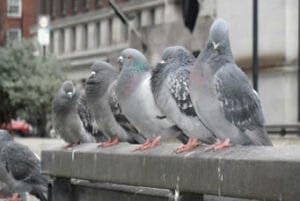
In 1850, when the news service Reuters was launched, they had on their staff 45 pigeons trained to transmit headlines and stock updates. Britain had a National Pigeon Service during WWII. Before satellites, pigeons flew into enemy zones with tiny cameras. In 2016, American performance artist Duke Riley trained 2,000 of them to fly, their legs fitted with tiny LEDs, in choreographed formation over Brooklyn, for 30 minutes.
Source
Pigeon Patrol Products & Services is the leading manufacturer and distributor of bird deterrent (control) products in Canada. Pigeon Patrol products have solved pest bird problems in industrial, commercial, and residential settings since 2000, by using safe and humane bird deterrents with only bird and animal friendly solutions. At Pigeon Patrol, we manufacture and offer a variety of bird deterrents, ranging from Ultra-flex Bird Spikes with UV protection, Bird Netting, 4-S Bird Gel and the best Ultrasonic and audible sound devices on the market today.
Voted Best Canadian wholesaler for Bird Deterrent products ten years in a row.
Contact us at 1- 877– 4– NO-BIRD, (604) 585-9279 or visit our website at www.pigeonpatrol.ca
Pigeon/Pigeon Patrol / Pigeons Roosting / Vancouver Pigeon Control /Bird Spikes / Bird Control / Bird Deterrent / Pigeon Deterrent? Surrey Pigeon Control / Pest /Seagull deterrent / Vancouver Pigeon Blog / Birds Inside Home / Pigeons in the cities / Ice Pigeons/ What to do about pigeons/ sparrows , Damage by Sparrows, How To Keep Raccoons Away, Why Are Raccoons Considered Pests/ De-fence / Pigeon Nesting/ Bird Droppings / Pigeon Dropping/ woodpecker control/ Professional Bird Control Company/ Keep The Birds Away/ Birds/rats/ seagull/pigeon/woodpecker/ dove/sparrow/pidgeon control/pidgeon problem/ pidgeon control/flying rats/ pigeon Problems/ bird netting/bird gel/bird spray/bird nails/ bird guard
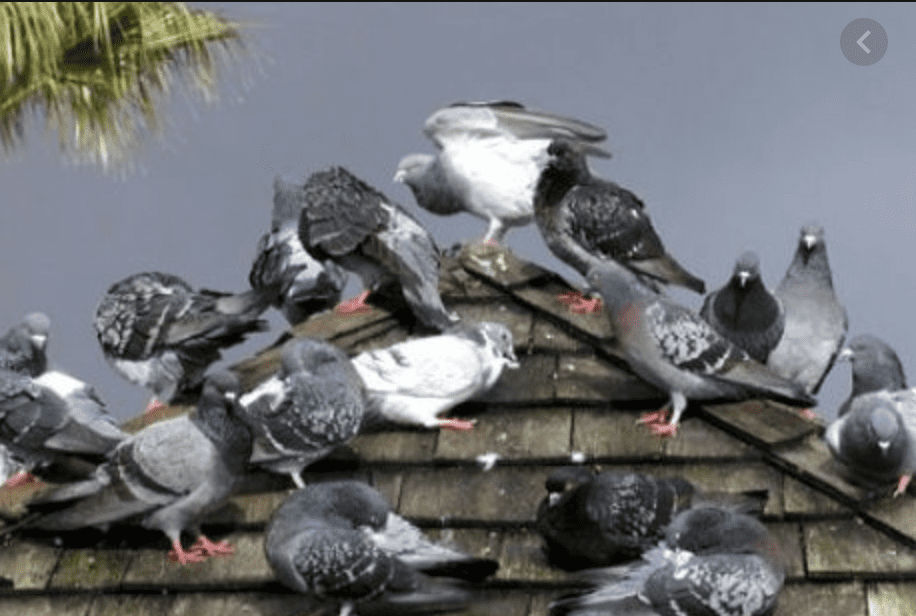
by Pigeon Patrol | Sep 21, 2021 | Bird Netting, Bird Spikes, Columbidae, Doves, Pigeon Control, Pigeon Droppings, Pigeon Patrol's Services
Affectionately known by many as ‘rats with wings’, pigeons are one of the most unloved birds around. While some of us simply don’t like their presence because of their reputation for being dirty, others have a genuine phobia of them (peristerophobia).
Do pigeons really deserve their bad reputation however?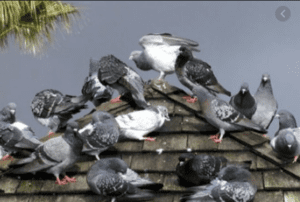
They carry more diseases than rats
Did you know that pigeons are the most unhygienic and messy of all the birds and they carry more harmful diseases to humans than rats do? One of the reasons for this is because they nest on their droppings which naturally, attracts mites. As a result, nearly all pigeons carry bird mite – a tiny insect which feeds off the bird and can cause humans to itch and scratch.
Bird fouling attracts insects
Pigeon fouling and nest materials also provide a home for many other insects including clothes moths, carpet beetle, fleas, flies and mealworm beetle which is why it can be such a nuisance to have them loitering around your home or business premises.
They can damage buildings
The uric acid present in pigeon faeces is highly corrosive and can cause extensive damage to metals and other materials it sits on for long periods of time. Furthermore, debris from flocks of pigeons often build up, backing up gutters and drains which can cause flooding and roof damage.
Nesting materials have also been known to cause faults in machinery, especially rooftop air conditioning units which are a prime nesting spot for these birds.
Pigeon droppings can cause accidents
Pigeon droppings can be slippery when wet, causing a slip hazard. This can be particularly problematic for the elderly and if you’re a business owner, you could be held accountable for any injuries sustained on your premises.
The bacteria, fungal agents and ectoparasites found in pigeon droppings can also cause a number of serious diseases including histoplasmosis, encephalitis, salmonella, meningitis, toxoplasmosis and many more.
Clean-up costs can be high
Whether a pigeon problem is affecting your home or business premises, the presence of bird droppings and nesting materials can be messy, unsightly and dangerous. If you don’t want to put people off entering your premises or don’t want to risk damage being caused to your home or building, it’s important for regular cleaning to take place.
This often requires hiring a professional because they have all the proper cleaning products and can access areas which are difficult to reach. If you have a serious pigeon problem, you may have to do this on a regular basis which can become incredibly costly.
Source
Pigeon Patrol Products & Services is the leading manufacturer and distributor of bird deterrent (control) products in Canada. Pigeon Patrol products have solved pest bird problems in industrial, commercial, and residential settings since 2000, by using safe and humane bird deterrents with only bird and animal friendly solutions. At Pigeon Patrol, we manufacture and offer a variety of bird deterrents, ranging from Ultra-flex Bird Spikes with UV protection, Bird Netting, 4-S Bird Gel and the best Ultrasonic and audible sound devices on the market today.
Voted Best Canadian wholesaler for Bird Deterrent products ten years in a row.
Contact us at 1- 877– 4– NO-BIRD, (604) 585-9279 or visit our website at www.pigeonpatrol.ca
Pigeon/Pigeon Patrol / Pigeons Roosting / Vancouver Pigeon Control /Bird Spikes / Bird Control / Bird Deterrent / Pigeon Deterrent? Surrey Pigeon Control / Pest /Seagull deterrent / Vancouver Pigeon Blog / Birds Inside Home / Pigeons in the cities / Ice Pigeons/ What to do about pigeons/ sparrows , Damage by Sparrows, How To Keep Raccoons Away, Why Are Raccoons Considered Pests/ De-fence / Pigeon Nesting/ Bird Droppings / Pigeon Dropping/ woodpecker control/ Professional Bird Control Company/ Keep The Birds Away/ Birds/rats/ seagull/pigeon/woodpecker/ dove/sparrow/pidgeon control/pidgeon problem/ pidgeon control/flying rats/ pigeon Problems/ bird netting/bird gel/bird spray/bird nails/ bird guard
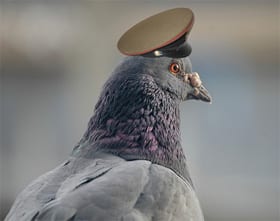
by Pigeon Patrol | Sep 21, 2021 | Bird Spikes, Columbidae, Doves, history of pigeons, MBCA, pet bird, Pigeon Control
Many thousands of pigeons lost their lives in WW2.
Carrier pigeons were widely used during WW1 since telephone and telegraph technology was too new to be reliable.
Though it occurred two decades later, carrier pigeons were once again relied upon to deliver important intel during WW2, despite the advances that had been made in communication technology.
They were relied upon due to their speed and intelligence, and the altitudes they could reach.
Carrier pigeons were able to carry messages back and forth over enemy lines, being credited with saving lives and aiding victory in many battles.
During WW2, hundreds of thousands of carrier pigeons were used by the American, British, French and German military and their bravery didn’t go unnoticed with pigeons being awarded the prestigious Dickin Medal.
The medal was introduced in December 1943 and is the decoration for valor awarded to animals.
32 WW2 pigeons were awarded the medal, including G.I. Joe, one of the United States most successful carrier pigeons.

Pigeons Used In Military operations
During WW2, pigeons used by the British military are credited with helping end Nazi rule in Europe.
Code named Columba, British pigeons were dropped in various locations throughout Europe with a cry for help from the British attached.
The message asked ordinary citizens to contribute to intelligence regarding life in occupation under the Nazi regime as well as military data.
More than 16,000 carrier pigeons were used in this mission and they uncovered many supporters and helped soldiers take out German regiments, as well as finding out important facts about camps and advancement plans.
Similar success stories come from all over the world, proving that carrier pigeons once again contributed to the ending of WW2 and carrying out rescue missions, saving lives and ensuring that vital intelligence ended up in the right hands.
Many of these pigeons have been stuffed and are on display around the world, shining a light on their service and educating the younger generations about the workings of WW2.
Perilous Journeys
As you can imagine, many carrier pigeons died in the line of duty.
Much like human soldiers or the many horses and dogs that were used in battle, not all of the pigeons were able to survive their mission.
Though, it’s important to note that many of them took bullets and were grievously injured, but still managed to deliver the message they carried into the right hands.
In addition to battle wounds, the Nazis often released falcons to kill the pigeons used by the American and British armies in an attempt to keep them from delivering the information they carried.
Salute to victory
While there are no exact numbers available, it’s thought that many thousands of carrier pigeons died during their service in WW2.
Many of them are commemorated and on display to this day, while others can only be remembered in other ways.
While carrier pigeons aren’t used to the same degree they once were, it’s important to preserve their place in history as part of the defeat of the Nazi party and the victory of those in opposition to the atrocities they committed.
Source
Pigeon Patrol Products & Services is the leading manufacturer and distributor of bird deterrent (control) products in Canada. Pigeon Patrol products have solved pest bird problems in industrial, commercial, and residential settings since 2000, by using safe and humane bird deterrents with only bird and animal friendly solutions. At Pigeon Patrol, we manufacture and offer a variety of bird deterrents, ranging from Ultra-flex Bird Spikes with UV protection, Bird Netting, 4-S Bird Gel and the best Ultrasonic and audible sound devices on the market today.
Voted Best Canadian wholesaler for Bird Deterrent products ten years in a row.
Contact us at 1- 877– 4– NO-BIRD, (604) 585-9279 or visit our website at www.pigeonpatrol.ca
Pigeon/Pigeon Patrol / Pigeons Roosting / Vancouver Pigeon Control /Bird Spikes / Bird Control / Bird Deterrent / Pigeon Deterrent? Surrey Pigeon Control / Pest /Seagull deterrent / Vancouver Pigeon Blog / Birds Inside Home / Pigeons in the cities / Ice Pigeons/ What to do about pigeons/ sparrows , Damage by Sparrows, How To Keep Raccoons Away, Why Are Raccoons Considered Pests/ De-fence / Pigeon Nesting/ Bird Droppings / Pigeon Dropping/ woodpecker control/ Professional Bird Control Company/ Keep The Birds Away/ Birds/rats/ seagull/pigeon/woodpecker/ dove/sparrow/pidgeon control/pidgeon problem/ pidgeon control/flying rats/ pigeon Problems/ bird netting/bird gel/bird spray/bird nails/ bird guard

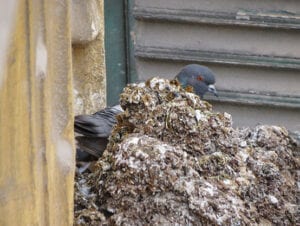




 You will usually see a pigeon poop when it is perching on a ledge or branch, or when it is foraging…but not when it is flying overhead.
You will usually see a pigeon poop when it is perching on a ledge or branch, or when it is foraging…but not when it is flying overhead.




